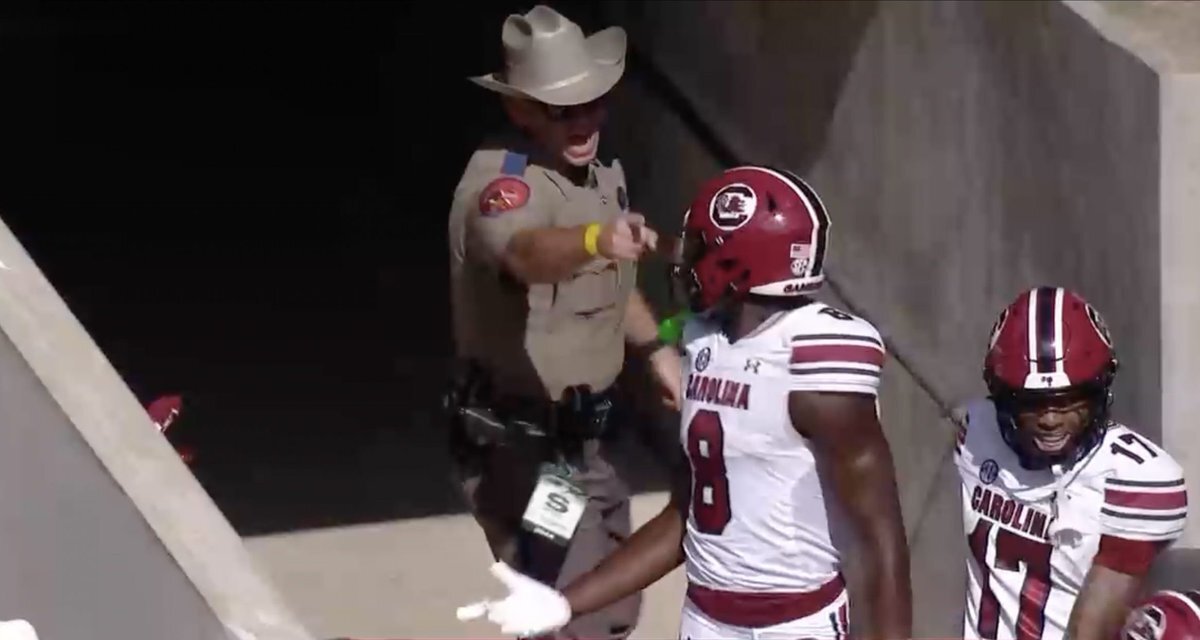He Bumped a Player. DPS Sent Him Home. Here’s What the Video Didn’t Show.
He Bumped a Player. DPS Sent Him Home. Here’s What the Video Didn’t Show.

Yesterday, a Texas Department of Public Safety Trooper went viral after making shoulder-to-shoulder contact with a University of South Carolina football player during the Texas A&M Football game. The clip was barely a second long, taken after a touchdown.
But that one second was all it took for the internet to become judge, jury, and character profiler.
One moment became the whole story.
But that’s rarely how real life works.
𝟏. 𝐎𝐟𝐟𝐢𝐜𝐞𝐫𝐬 𝐀𝐫𝐞 𝐇𝐮𝐦𝐚𝐧; 𝐅𝐮𝐥𝐥 𝐒𝐭𝐨𝐩
We expect officers to operate like perfectly rested, perfectly composed machines. But officers deal with everything everyone else deals with:
Stress. Fatigue. Family illness. Loss. Financial pressure. Emotional strain. Sleepless nights.
The difference?
𝑻𝒉𝒆𝒚 𝒅𝒆𝒂𝒍 𝒘𝒊𝒕𝒉 𝒊𝒕 𝒘𝒉𝒊𝒍𝒆 𝒃𝒆𝒊𝒏𝒈 𝒓𝒆𝒄𝒐𝒓𝒅𝒆𝒅, 𝒄𝒓𝒊𝒕𝒊𝒄𝒊𝒛𝒆𝒅, 𝒂𝒏𝒅 𝒆𝒙𝒑𝒆𝒄𝒕𝒆𝒅 𝒕𝒐 𝒎𝒂𝒌𝒆 𝒇𝒍𝒂𝒘𝒍𝒆𝒔𝒔 𝒅𝒆𝒄𝒊𝒔𝒊𝒐𝒏𝒔 𝒐𝒏 𝒄𝒐𝒎𝒎𝒂𝒏𝒅.
That doesn’t excuse mistakes, but it absolutely shapes how they happen.
𝟐. 𝐖𝐡𝐚𝐭 𝐢𝐟 𝐭𝐡𝐞𝐫𝐞’𝐬 𝐦𝐨𝐫𝐞 𝐰𝐞 𝐝𝐨𝐧’𝐭 𝐬𝐞𝐞?
We don’t know what the trooper was dealing with in the hours or even minutes leading up to this incident.
What if…
🔹he just learned a loved one has cancer?
🔹he hasn’t slept because of a family crisis?
🔹he came straight from a traumatic call?
🔹he worked a 10–12 hour shift and THEN worked stadium security afterward?
🔹he reacted to a sudden movement in a chaotic environment and misread it in the moment?
𝑵𝒐𝒏𝒆 𝒐𝒇 𝒕𝒉𝒐𝒔𝒆 𝒑𝒐𝒔𝒔𝒊𝒃𝒊𝒍𝒊𝒕𝒊𝒆𝒔 𝒋𝒖𝒔𝒕𝒊𝒇𝒚 𝒕𝒉𝒆 𝒃𝒆𝒉𝒂𝒗𝒊𝒐𝒓.
But they absolutely provide perspective.
Understanding context is not the same as excusing conduct.
𝟑. 𝐄𝐱𝐭𝐫𝐚-𝐝𝐮𝐭𝐲 𝐝𝐞𝐭𝐚𝐢𝐥𝐬 𝐚𝐫𝐞𝐧’𝐭 𝐰𝐡𝐚𝐭 𝐩𝐞𝐨𝐩𝐥𝐞 𝐭𝐡𝐢𝐧𝐤
Most stadium security assignments are done on overtime, after a full patrol shift. It’s physically exhausting and mentally draining.
This isn’t a relaxed 9-to-5 add-on.
It’s long hours → loud crowds → nonstop movement → heightened emotion → and cameras everywhere.
These environments make decision-making more challenging, especially when an officer is already exhausted.
Again, not an excuse.
But it’s relevant to the full picture.
𝟒. 𝐀𝐜𝐜𝐨𝐮𝐧𝐭𝐚𝐛𝐢𝐥𝐢𝐭𝐲 𝐬𝐭𝐢𝐥𝐥 𝐦𝐚𝐭𝐭𝐞𝐫𝐬, 𝐚𝐧𝐝 𝐡𝐞 𝐬𝐡𝐨𝐮𝐥𝐝 𝐡𝐚𝐯𝐞 𝐝𝐨𝐧𝐞 𝐛𝐞𝐭𝐭𝐞𝐫
Let’s be very clear:
✔️ He should have stepped aside.
✔️ He should have maintained professional distance.
✔️ DPS was right to send him home and review the incident.
✔️ The behavior needs to be addressed.
But two things can be true at once:
The action was inappropriate.
And a one-second video is nowhere near enough to define an entire human being.
Some people want to pretend officers aren’t human.
Some people want to believe that personal struggles never affect their decisions.
Reality doesn’t work that way.
⭐ 𝐀 𝐪𝐮𝐢𝐜𝐤 𝐦𝐞𝐬𝐬𝐚𝐠𝐞 𝐭𝐨 𝐭𝐡𝐞 𝐜𝐫𝐢𝐭𝐢𝐜𝐬…
Before anyone jumps in with, “𝑆𝑡𝑜𝑝 𝑗𝑢𝑠𝑡𝑖𝑓𝑦𝑖𝑛𝑔 𝑒𝑣𝑒𝑟𝑦𝑡ℎ𝑖𝑛𝑔 𝑐𝑜𝑝𝑠 𝑑𝑜!” let me be crystal clear:
I’m not justifying anything.
I’m explaining something.
There’s a difference.
You can hold someone accountable and still ask,
“What contributed to this? What do we learn from it? How do we prevent it?”
That’s not defending misconduct.
That’s leadership.
If we stop at “He was wrong, end of story,” then we learn nothing.
We fix nothing.
We improve nothing.
Accountability matters.
Context matters.
And both can, and should, coexist.
𝟓. 𝐓𝐡𝐞 𝐛𝐢𝐠𝐠𝐞𝐫 𝐦𝐞𝐬𝐬𝐚𝐠𝐞
This moment isn’t just about one trooper.
It’s about all of us:
How quickly we judge.
How confidently we assign motive.
How little context we require before condemning someone.
How easily we assume we know everything from a single clip.
For the public:
𝗣𝗮𝘂𝘀𝗲 𝗯𝗲𝗳𝗼𝗿𝗲 𝗱𝗲𝗰𝗶𝗱𝗶𝗻𝗴 𝘆𝗼𝘂 𝗸𝗻𝗼𝘄 𝘁𝗵𝗲 𝘄𝗵𝗼𝗹𝗲 𝘀𝘁𝗼𝗿𝘆.
For officers:
𝗘𝘃𝗲𝗿𝘆 𝘀𝗲𝗰𝗼𝗻𝗱 𝗺𝗮𝘁𝘁𝗲𝗿𝘀, 𝗲𝘀𝗽𝗲𝗰𝗶𝗮𝗹𝗹𝘆 𝗼𝗻 𝗰𝗮𝗺𝗲𝗿𝗮.
For leaders:
𝗧𝗿𝗮𝗶𝗻 𝗳𝗼𝗿 𝘁𝗵𝗲 𝘂𝗻𝘀𝗲𝗲𝗻: 𝗳𝗮𝘁𝗶𝗴𝘂𝗲, 𝘁𝗿𝗮𝘂𝗺𝗮, 𝗴𝗿𝗶𝗲𝗳, 𝘀𝘁𝗿𝗲𝘀𝘀...𝘁𝗵𝗲 𝗳𝗮𝗰𝘁𝗼𝗿𝘀 𝘁𝗵𝗮𝘁 𝗮𝗰𝘁𝘂𝗮𝗹𝗹𝘆 𝗱𝗿𝗶𝘃𝗲 𝗱𝗲𝗰𝗶𝘀𝗶𝗼𝗻-𝗺𝗮𝗸𝗶𝗻𝗴.
For everyone:
𝗘𝘅𝘁𝗲𝗻𝗱 𝘁𝗵𝗲 𝘀𝗮𝗺𝗲 𝗴𝗿𝗮𝗰𝗲 𝘆𝗼𝘂’𝗱 𝗵𝗼𝗽𝗲 𝘁𝗼 𝗿𝗲𝗰𝗲𝗶𝘃𝗲 𝗼𝗻 𝘆𝗼𝘂𝗿 𝘄𝗼𝗿𝘀𝘁 𝗱𝗮𝘆.
A one-second video can start a narrative.
But it should never define a human being.
Stay Safe! 💙

